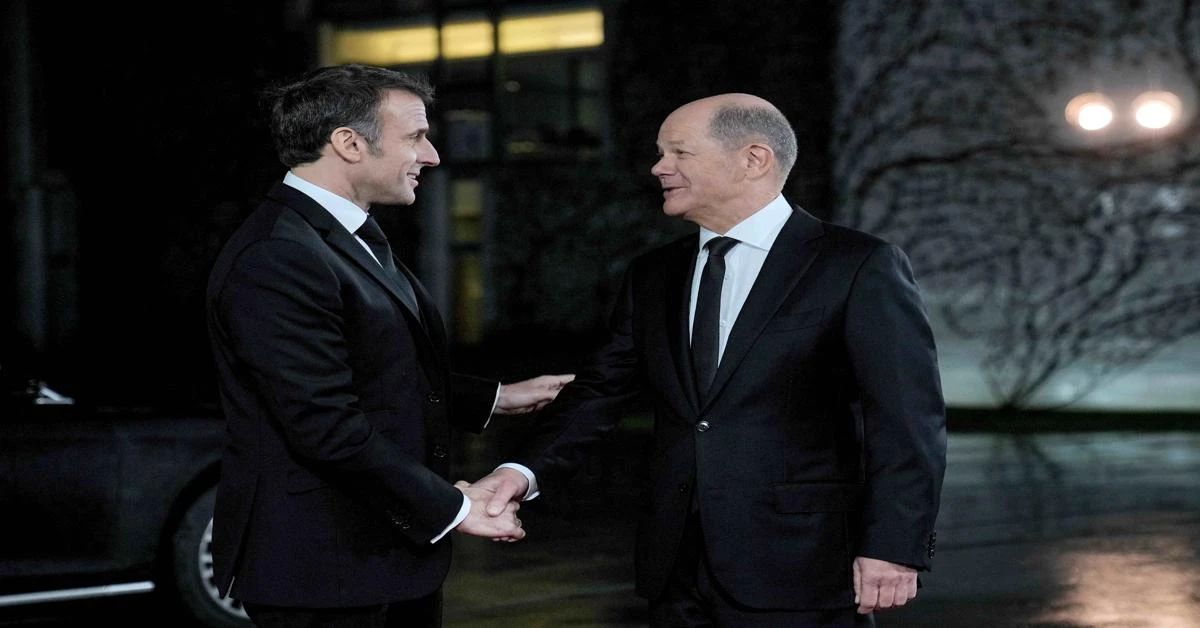Scholz to host Macron amid Ukraine support disagreements

Polish Prime Minister Donald Tusk joins European leaders in crucial talks to boost military support for Kyiv
Poland’s Prime Minister Donald Tusk, Germany’s Chancellor Olaf Scholz, and France’s President Emmanuel Macron will convene in Berlin for urgent discussions on providing aid to Ukraine this Friday.
After a clear-the-air meeting in the chancellery, Polish Prime Minister Donald Tusk will join the pair for urgent consultations on further European military backing for Kyiv.
Ukraine has faced a series of battlefield setbacks in repelling Russian troops, as its forces have faced critical shortages of ammunition and aid from Western allies.
Right-wing Republicans are blocking a massive US aid package of $60 billion in Congress, and President Joe Biden has acknowledged that the $300 million of stopgap support announced Tuesday was “not nearly enough.”
Tusk said Paris, Berlin, and Warsaw ” must mobilize all of Europe” to provide Ukraine with fresh aid.
However, simmering disagreements between Macron and Scholz threatened to undermine cooperation between the allies.
Nico Lange, an analyst for the Munich Security Conference (MSC), said that debates between France and Germany “may have culminated in what we have seen in the last weeks, but there have been difficulties for quite a long time now.”
‘Calculated effort’
Lange said the summit of the so-called Weimar Triangle of European powers in Berlin was a “good sign that finally… the errors are corrected to some extent”.
Germany’s European partners have been frustrated by Scholz’s refusal to provide Ukraine with its long-range Taurus missiles despite Kyiv’s urgent calls.
Conversely, the chancellor reacted angrily to Macron’s refusal to rule out sending troops to Ukraine and his pointed comments urging allies not to be “cowards.”
Jacob Ross from the German Council on Foreign Relations (DGAP) said that with his comments, the French president sought “to restore a certain level of strategic ambiguity” to complicate Russian President Vladimir Putin’s decision-making.
Ross said the remarks may also have been a “calculated effort” to rally Eastern European allies, provoking a debate on where to draw the line on help for Ukraine.
However, the pressure from Macron has also shone a spotlight on glaring differences with Scholz.
He told parliament on Wednesday that German soldiers participating in the conflict is “a limit that I, as chancellor, do not want to cross.”
This applied not just to the deployment of army personnel in Ukraine but also to any potential operational planning in Germany, he said in outlining his reasons for refusing to supply Taurus missiles.
At no point should German soldiers help select “where will be targeted… where will be hit”, Scholz said, a service he has suggested French officials provide to Ukraine for the long-range Scalp missiles supplied by Paris.
Macron remained combative late Thursday when he told French television a Russian victory in Ukraine “would reduce Europe’s credibility to zero,” insisting that the continent’s security was “at stake.”
Warning allies against imposing limits on assistance, he added: “If the situation should deteriorate, we would be ready to make sure that Russia never wins this war.”
He also said that anybody advocating “limits” on aid to Ukraine “chooses defeat.”
‘Different opinions’
Despite their differences, Scholz said he and Macron had a “perfect personal relationship,” as shown by their frequent consultations.
“The strength of the cooperation comes particularly from the fact that we do this even when both countries have different opinions on individual issues,” Scholz said.
Scholz said Friday’s meeting is of “great importance” for allies to “organize as much support as possible for Ukraine.” He spoke Thursday by phone with Ukraine’s President Volodymyr Zelenskyy and underlined Germany’s “unbroken solidarity” with Kyiv.
Germany is Ukraine’s second-largest backer after the United States, but European efforts to mobilise support have faced challenges.
The EU is pushing to bolster weapons and ammunition production through its defense industry, but with the war in its third year, it is still struggling to ramp up output.
Poland has been one of Ukraine’s staunchest allies, and Lange said Tusk’s presence, a seasoned politician who served as European Council president, would help “moderate differences” in French-German relations.
On Ukraine, it was in the overarching interest to “move closer together,” he said.
Source: AFP
#haber#



